|
|
|
Sort Order |
|
|
|
Items / Page
|
|
|
|
|
|
|
| Srl | Item |
| 1 |
ID:
179260
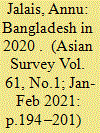

|
|
|
|
|
| Summary/Abstract |
Early in the COVID-19 pandemic, Bangladeshi economist Mushfiq Mobarak argued that in developing countries, lockdown-based social distancing would not be feasible to mitigate its spread. This was because they would be unable to impose restrictions, undertake mass testing, or provide adequate safety nets to the poor. Bangladesh was one of the first countries to allow the reopening of work places (as early as April 28, 2020), especially in the export-oriented garment industry, and has done economically better than its South Asian counterparts. A crucial enabling factor for this pandemic-era economic growth has been the explosive boom in digital money. On the downside, free speech has been sharply curtailed, and women’s futures were further jeopardized when the garment industry was severely hit by order cancellations. But perhaps the most frightening development is the effect of climate breakdown and the mass movement of populations within Bangladesh as well as in and out of the country.
|
|
|
|
|
|
|
|
|
|
|
|
|
|
|
|
| 2 |
ID:
180047
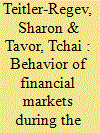

|
|
|
|
|
| Summary/Abstract |
COVID-19 pandemic created a health emergency that led to a huge global economic crisis. This article examines the effects of a wide range of variables including the number of infections, deaths, and recoveries, as well as categorical variables like public behaviour and government restrictions on stock indexes on 16 different countries. It compares the situation in Israel with the other explored countries. The regression analysis revealed that while in Israel all the variables affected stock-index returns, in the other countries only a few of the variables did so.
|
|
|
|
|
|
|
|
|
|
|
|
|
|
|
|
| 3 |
ID:
182437
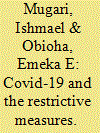

|
|
|
|
|
| Summary/Abstract |
The emergence of the COVID-19 pandemic at the onset of the year 2020 brought unprecedented suffering to humanity. Economic activities in virtually all nations across the globe were brought to a shuddering halt, with the third world suffering the worst effects on the economic front. The health security of nations across the globe was shaken, as nations came to terms with the surging health needs for the infected citizens. In order to grapple with the pandemic, nations took drastic measures, chief among them being the implementation of lockdowns, coupled with harsh restrictions. These measures, however, came at a cost. This paper explores the impacts of the restrictive measures that were implemented by the Zimbabwean government to combat COVID-19 pandemic. The paper interrogates these measures in the context of the national security discourse. In the analysis, the paper also makes reference to South Africa- a more developed nation and Zimbabwe’s neighbour.
|
|
|
|
|
|
|
|
|
|
|
|
|
|
|
|
| 4 |
ID:
173582
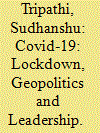

|
|
|
|
|
| Summary/Abstract |
Fortunately, the overall situation in India is far better as compared to most of the other rich powers including the US, because the otherwise worsening pandemic due to Covid-19 has been well-controlled under the visionary leadership of PM Narendra Modi, by immediately imposing three week’s lock down and further extending it by 19 days, which had amazing reduced the likely figure of eight lakhs plus Corona virus-infected patients to around few thousands by the end of lockdown 2.0. But as is clearly visible that the pandemic is still beyond the expected limits in many parts of the country despite two months long efforts by both Union and states governments to contain its spread and that is substantiated by the rising number of Corona infected patients.
|
|
|
|
|
|
|
|
|
|
|
|
|
|
|
|
| 5 |
ID:
175901
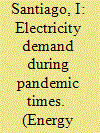

|
|
|
|
|
| Summary/Abstract |
Electricity demand and its typical load pattern are usually affected by many endogenous and exogenous factors to which the generation system must accordingly respond through utility operators. Lockdown measures to prevent the spread of COVID-19 imposed by many countries have led to sudden changes in socioeconomic habits which have had direct effects on the electricity systems. Therefore, a detailed analysis of how confinement measures have modified the electricity consumption in Spain, one of the countries most affected by this pandemic, has been performed in this work. Its electricity consumption has decreased by 13.49% from March 14 to April 30, compared to the average value of five previous years. Daily power demand profiles, especially morning and evening peaks, have been modified at homes, hospitals, and in the total power demand. These changes generate a greater uncertainty for the System Operator when making demand forecasts, but production deviations have increased by only 0.1%, thanks to the presence of a diversified generation mix, which has been modified during this period, increasing the proportion of renewable sources and decreasing CO2 emissions.
|
|
|
|
|
|
|
|
|
|
|
|
|
|
|
|
| 6 |
ID:
175000
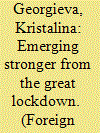

|
|
|
| 7 |
ID:
182427


|
|
|
|
|
| Summary/Abstract |
The emergence of the novel coronavirus (COVID-19) in November 2019 has nearly brought the world to a halt. Recording her first COVID-19 case on 27 February 2020, the Nigerian government’s default response to the pandemic was to lock down major parts of the country, among other measures. Despite the nationwide lockdown, inter-state travel continued unabated as many travellers bribed their way through the different checkpoints mounted by security agencies. As a result of the prevalence of ‘normed corruption’, the lockdown only created opportunity for brazen extortion by law enforcement officials. Using the institutional corruption theory as our framework of analysis, and coupled with the use of both primary and secondary data generated during the lockdown, the paper noted that entrenched culture of extortionate policing in the ranks of security forces meant that arrest and prosecution of violators of the lockdown became a distant concern. The result is that COVID-19 suspects or carriers travelled from one state to another without being detected. It concludes that Nigeria should leverage lessons learned from policing COVID-19 in framing future responses in containment
|
|
|
|
|
|
|
|
|
|
|
|
|
|
|
|
| 8 |
ID:
182754
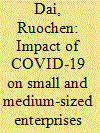

|
|
|
|
|
| Summary/Abstract |
This paper examines the short-term and mid-term impact of COVID-19 restrictions on SMEs, based on two waves of phone interviews with a previously surveyed large SME sample in China. The outbreak of COVID-19 and the resultant lockdowns took a heavy toll on SMEs. Afflicted by problems of logistics blocks, labor shortages, and drops in demand, 80% of SMEs were temporarily closed at the time of the first wave of interviews in February 2020. After reining in COVID-19, authorities largely eased lockdown restrictions in April. Consequently, most SMEs had reopened by the time of the second round of surveys in May. However, many firms, particularly export firms, were running at partial capacity, primarily due to inadequate demand. Moreover, around 19% of incorporated enterprises and 25% of self-employed businesses had permanently closed between the two waves of surveys.
|
|
|
|
|
|
|
|
|
|
|
|
|
|
|
|
| 9 |
ID:
187817
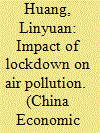

|
|
|
|
|
| Summary/Abstract |
This paper studies the impact of lockdown measures in response to the outbreak of COVID-19 on a prefecture's air pollution in China. To avoid potential endogenous problems, we exploit the bilateral population flow from the Baidu Migration Index to predict prefectures' probability to undertake lockdown measures. Our results using difference-in-differences with the instrumental variable show that a prefecture's lockdown measures significantly reduce its air quality index (AQI) by around 35%, and yet the result for difference-in-differences with OLS is only around 11%. We also find that a prefecture under lockdown reduces its PM10 and PM2.5 by around 25% and 35% respectively, and the results of diff-in-diff with OLS are only around 11% and 12%. The sharp difference between these two approaches seems to imply that there is a strong heterogeneity in lockdown stringency across prefectures.
|
|
|
|
|
|
|
|
|
|
|
|
|
|
|
|
| 10 |
ID:
179258
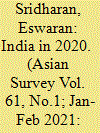

|
|
|
|
|
| Summary/Abstract |
The year 2020 was one of multiple challenges for India and for the Modi-led Bharatiya Janata Party government. The year began with mass protests against the Citizen (Amendment) Act, which minority Muslims saw as threatening their citizen rights and was widely felt to be unconstitutional, and ended with mass protests by farmers against market-oriented farm reforms. The coronavirus pandemic arrived in January and by the end of the year had caused the world’s second-largest caseload (10.3 million infections) and 149,000 deaths. The government responded with a strict lockdown, resulting in a severe economic contraction, although the economy and foreign investment picked up in the last quarter, buoyed by vaccine hopes and a partial economic recovery. On the foreign front, Chinese incursions in June along the Line of Actual Control, the de facto border, led to a tense standoff that remained unresolved at year-end. Politically, the BJP remained not only entrenched but somewhat further empowered against a weak and divided opposition, with Modi’s popularity ratings high.
|
|
|
|
|
|
|
|
|
|
|
|
|
|
|
|
| 11 |
ID:
188684
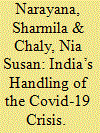

|
|
|
|
|
| Summary/Abstract |
Covid-19 exposed the fragility and inadequacies in India’s health care system, especially in its public health services. The sudden lockdown imposed during the first wave of the virus severely impacted the livelihoods of millions of migrant workers. Then, in spite of warnings about an impending second wave of infection, the government’s failure to prepare the health infrastructure, together with delays in vaccine distribution, cost the lives of hundreds of thousands of people. Unlike the first wave of infection, the second wave impacted rural India very badly. Taking into consideration the existing social hierarchies and inequalities, it was marginalised groups of the population who bore the brunt of the pandemic. This article analyses the failures of the Indian government in handling the Covid-19 crisis, especially during the second wave, and concludes by suggesting ways in which the state needs to intervene to avert disasters of this kind in the future. It argues for the adoption of a ‘rights-based’ approach to public health on the grounds that successive governments have not been properly held to account for their long-term failures to address the issue.
|
|
|
|
|
|
|
|
|
|
|
|
|
|
|
|
| 12 |
ID:
188683
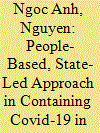

|
|
|
|
|
| Summary/Abstract |
Vietnam's efforts to contain the Covid-19 pandemic have been widely praised. The country's leadership took early action to close its borders and reduce community transmission and kept case numbers low, at least in the first year. Between 23 January 2020, when the first cases were detected in Vietnam, and 25 March 2021, the end of the third wave of infection, the country experienced just 2,830 cases and 35 deaths. However, the fourth wave, from 27 April 2021 to 30 March 2022 (when the Vietnamese government declared a formal end to the pandemic), saw over ten million confirmed cases, and 42,454 recorded fatalities. This article examines why the first three waves were successfully contained and the fourth wave of COVID was so much more damaging.
|
|
|
|
|
|
|
|
|
|
|
|
|
|
|
|
| 13 |
ID:
180045
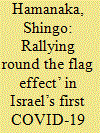

|
|
|
|
|
| Summary/Abstract |
This article analyzes the surge in support for PM Benjamin Netanyahu during the first wave of the coronavirus pandemic in Israel within the framework of the rally effect. Israel was chosen as a case study for two reasons. First, the country was repeatedly polled during the first wave of infection. Second, a strict compartmentalised lockdown limited to certain areas, as a natural experimentation, had been in place for some time. These two factors fresh important light on the circumstances under which a society supports its political leaders during a national crisis.
|
|
|
|
|
|
|
|
|
|
|
|
|
|
|
|
|
|
|
|
|